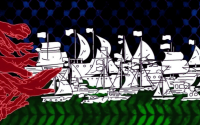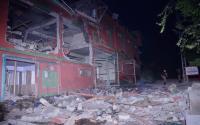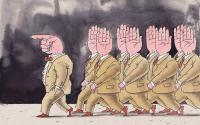Common Dreams / Published on Monday, October 10, 2005 by the Boston Globe
The ancient myth has it that a person entering the maze will never find the way out. As if that were not terrifying enough, inside the maze lives the beast whose special appetite is for the young. The maze is a cluster of tricks, paths to nowhere, the realm of dead ends. There is no escape. The young must fear being eaten alive, but an eternity of false exits threatens everyone.
The maze is a daunting metaphor, an image of psychological imprisonment. At night, the dream of the maze comes to every sleeper, involving movement through a string of corridors that lead only into other corridors. Humans can be afraid even in the absence of the thing that kills. Not getting out can be terrifying enough. Dreams in which the monster actually appears, with child's blood on its teeth, have a simpler function -- to awaken the knowledge that the future itself can be at risk.
For ancient Athens, the maze was on the island of Crete, and the monster was the Minotaur. For America, the maze is in Iraq, and the monster is labeled ''insurgency." This is no myth, no metaphor, no dream. The war is America's prison. Our politics are paralyzed now because no one can imagine the way out. Youthful GIs and Marines hustle from one dead end to another, from the false exit of Iraqi ''sovereignty" to the trap door of the constitutional vote to the trick mirror of Iraqi armed forces that can take over ''security." This string of exitless corridors leads our troops ever deeper into the maze, more at the mercy of the devouring monster than ever.
Just as Athens sent its boys and girls to feed the Minotaur, keeping the beast appeased and far away, so -- just so -- does Washington. But in our circumstance, the sacrificial offering of the young is not quite working. Here is the ironic surprise that only recently dawns on the United States: We have followed our young ones into the maze. We are a lost nation, right behind them.
Iraq is far away, but its maze transcends locality. US foreign policy is the maze now; so is the evening news, and so are the pages of the newspapers that arrive each morning. We sit at our breakfast tables wide awake, yet the feeling of dreams is over everything. The corridors of American consciousness open only into other corridors. We hustle from one threshold to the next, busier than ever, but we never come out. This war was the entrance into a world with no exit. Those who oppose the war and those who support it are alike in feeling a vast demoralization. And if it remains true that, of Americans, the literal violence of the monster consumes only the uniformed young, the rest of us have begun to devour ourselves.
We were so afraid that some awful thing would come at us from outside our walls. It didn't have to. The walls defined us, walls that open only into other walls. No wonder the Democrats have nothing to say. No wonder the Republicans are reduced to whining about the indictments of their leaders. The president has given up pretending that he has a clue. Like a pink-eyed mouse in a laboratory, he makes his blind circuit through the maze of his own limited imagination. Unlike the president, the laboratory mouse knows better than to pretend its panicked running reflects the virtue of steadfastness. This is how the nation's leadership behaves when it sees no way out of the horror it has created.
How else might citizens think of this situation? There is the maze, with its false trails and dead ends, a geography of despair. But in the dream life of humans, and in the store of metaphor, there is something else -- a labyrinth. In common parlance the words are interchangeable, but there is a difference, and it is instructive. A labyrinth is winding and mysterious but has only one pathway, no tricks, and no cul-de-sacs. To follow this trail in patience and humility is to come, eventually, to a center, which is the knowledge of contemplative truth.
Purposeful walking is the opposite of panicked flight. That is why labyrinths are on the floors of cathedrals, not prisons. To find the way into the heart of the labyrinth is, simultaneously, to find the way out. The labyrinth, therefore, answers the maze. How do we leave Iraq? By reversing ourselves and simply leaving.
James Carroll's column appears regularly in the Globe. His most recent book is "Crusade: Chronicles of an Unjust War."






